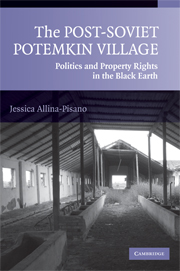Book contents
- Frontmatter
- Contents
- List of Maps, Illustrations, and Tables
- Acknowledgments
- Note on Transliteration
- Note on Sources and Methodology
- Glossary
- Two regions of the Black Earth, Voronezh and Kharkiv oblasti, 1991–present
- Voronezh oblast' in the twenty-first century
- Kharkiv oblast' in the twenty-first century
- The Post-Soviet Potemkin Village
- Introduction: Land Reform in Post-Communist Europe
- 1 Things Fall Apart
- 2 Keeping the Collectives
- 3 The Social Origins of Private Farmers
- 4 A Return to Regulation
- 5 The Politics of Payment
- 6 The Facade
- Conclusion: Rural Proletarians in the Potemkin Village
- Index
4 - A Return to Regulation
Published online by Cambridge University Press: 27 July 2009
- Frontmatter
- Contents
- List of Maps, Illustrations, and Tables
- Acknowledgments
- Note on Transliteration
- Note on Sources and Methodology
- Glossary
- Two regions of the Black Earth, Voronezh and Kharkiv oblasti, 1991–present
- Voronezh oblast' in the twenty-first century
- Kharkiv oblast' in the twenty-first century
- The Post-Soviet Potemkin Village
- Introduction: Land Reform in Post-Communist Europe
- 1 Things Fall Apart
- 2 Keeping the Collectives
- 3 The Social Origins of Private Farmers
- 4 A Return to Regulation
- 5 The Politics of Payment
- 6 The Facade
- Conclusion: Rural Proletarians in the Potemkin Village
- Index
Summary
Land privatization did not extricate the state from rural economies, whatever the desires of reform ideologists. An important underlying purpose of enclosure, the depoliticization of economic activity, did not occur: as Barnes has shown, political struggles continued long after formal privatization processes had been completed. Instead, the withdrawal of national governments from some areas of agriculture left a vacuum, and land privatization provided local officials the opportunity to reassert their influence. In certain areas of land use regulation, state control at the district and regional levels intensified through the process of reform, even as state assistance in ordering relations among enterprises fell away. The persistence of large-scale agricultural enterprises kept the countryside “legible,” and smaller-scale agricultural entrepreneurs who had managed to acquire land found themselves subject to scrutiny and regulation of their holdings by land committees, land tenure offices, offices of economic planning, and other local state institutions. Those who did leave collectives risked losing the support of social networks, even as they were newly vulnerable under the watchful gaze of local officials.
Amidst unreformed relationships between local state regulatory institutions and agricultural enterprises, private ownership without political power held little practical meaning. Most private farmers owned the land they cultivated, but ownership carried with it a limited bundle of rights. State administrations deployed old models of state–economy relationships in their oversight of private farms: rather than adapting their regulatory practices to new private property rights regimes, they made demands of landholders that forced many farmers out of business, frequently leading to the repossession of privately owned farmland.
- Type
- Chapter
- Information
- The Post-Soviet Potemkin VillagePolitics and Property Rights in the Black Earth, pp. 113 - 138Publisher: Cambridge University PressPrint publication year: 2007



